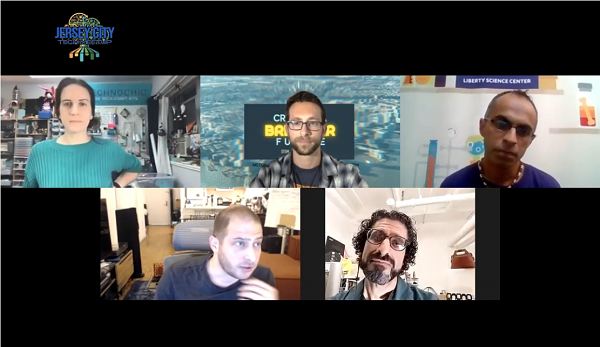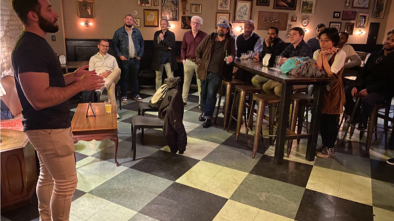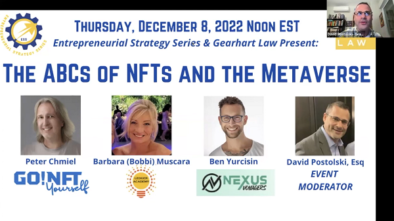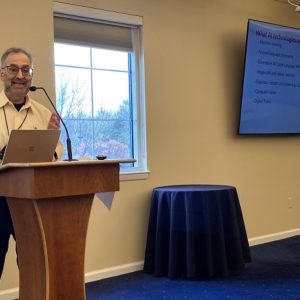The Jersey City Tech Meetup Looks at Makers Creating a Brighter Future Through STEAM, Tech and Community
At the November Jersey City Tech Meetup event, the panelists contemplated how the city’s makers could help Jersey City continue to be an inclusive, cutting-edge, smart city that incorporates STEAM into its fiber.
Speaking on the panel were:
Justin Handsman, founder of Jersey City Rapid Maker Response Group, a recently launched organization that makes personal protective equipment (PPE) and donates it across the country. The 100% virtual volunteer collective came into existence following a single Reddit post by Handsman in early April 2020. It has already donated 250,000 face shields for frontline hospital workers.
Eric Nadler, founder of JC Fab Lab, a specialized makerspace centered around architecture and design. JC Fab Lab is essentially an incubator and fabricator for people who like to invent, design and make things. Find them via @jcfablab on Instagram.
Natasha Dzurny, owner of TechnoChic, an organization creating tech craft kits that combine arts, crafts and technology, with the goal of encouraging more girls to have an interest in the “mash-up” of those worlds starting at a younger age. Natasha is also launching a Kickstarter campaign.
Deepesh Dhingra, senior exhibition leader at the Liberty Science Center (LSC) where anything not bolted to the walls or to the ground is under his purview. The LSC features special installments, programs and activities.
Here are a few of the topics covered in the discussion, which was moderated by Ben Yurcisin, the group’s lead organizer.
The Definition of a Maker, and What Makers Do
Dhingra – Anyone with a creative thought can solve a problem by utilizing and channeling accessible options available to them. We innovate, invent and create based on need, and what we are trying to achieve.
Handsman – People do all types of wacky and creative things that are a bridge into art. Cosplay and robotics are examples. I think of it as much broader: Anyone that makes or designs something is part of the maker movement … people who build and do things.
Nadler – Access, accessibility and adaptive design are all part of our mission. We strive to partner with people that do this work, and enable them to do so.
The STEAM Community Emphasizing Inclusivity
Dhingra – LSC’s mission is to help people learn about science in a fun way and also to inspire visitors to solve real world problems. Museums and science centers are extremely important, especially now. We need science to help us get out of situations and better our ways of fixing things. We are vital and are accessible to everyone. LSC exposes children to science and tech, giving them a snapshot or appetizer, and hopefully inspiring them for the future.
Dzurny – We create programming and products that reach out to the younger generation, and to adults that want to learn a new skill, too. Some examples: simple electronic circuitry kits, as well as paper and cardboard engineering kits. Recently, I’ve been working on some online programs and digital products. I see a lot of New Jersey libraries turning into community centers and makerspaces recently. My vision for the future is that libraries teach more basic skills to their communities. My parents owned a computer store when I was a child. When I was young, I was exposed to computers and tech, but I think there was a stereotype against teaching girls these things back then.
Handsman – I had a parent pass away during my freshman year of high school, and we had to move two weeks later. I was put into a new and different science and tech program, and this helped change my life. It was a backdoor way into robotics. I had been a loner, and I learned all types of new skills and how to operate a variety of tools in the lab. I specifically teach kids today at second-chance schools and those that have been disadvantaged for a variety of reasons — for example, fleeing their homeland or failing out of school due to extreme violence. Access to scholarship money can completely change the trajectory of a child’s life, and give them access to college. These are typically small programs, and we can fortunately give kids more attention.
Nadler – Science has its limits, and art has an extremely important role. Therefore, we should refer to “STEAM,” instead of “STEM.” Art practice is essential to our souls and mental health, as well as our health overall, especially during the current times of isolation due to COVID. We are letting our community members bring home 3D printers and also pivoting into a hybrid online educational programs, including incorporating new technologies, such as augmented reality.
Makerspaces as Entrepreneurial, Community-Oriented Businesses
Dzurny – Rising Tide Capital [Jersey City] helped me get off the ground. I took a business course there. There’s a huge opportunity for local government officials and organizations to channel more money into makerspaces.
Nadler – Some of the more successful entrepreneurial businesses have been real estate plays, hosting companies. I don’t think many makerspaces are linked in that way. Our organization has benefited from alliances with other groups. I believe it’s our job to provide a facility and training for people whose jobs may be eliminated. I would also like to see local money be channeled to makerspaces, which are helping support the community.
Dhingra – We reach out to grants and funders seeking financial support. We started relatively late with establishing LSC’s own makerspace. Prior to the launch, we researched what other museums were doing and also surveyed our visitors to see if there was interest and demand. Starting something from scratch — like Justin, Natasha and Eric — is incredibly difficult. It’s absolutely mandatory for us to have spaces for people to come and test their ideas and creations, which will ultimately benefit everyone.
The Future of STEAM in Jersey City
Handsman – I have started multiple businesses in totally different fields, and I want to point out that there are many ways to receive support, including from local banks; the SBA; economic development corps; and SCORE, which is retired executives mentoring small business owners for free. Starting a makerspace can be capital-intensive in terms of equipment, real estate, etc. We explored building a nonprofit that could help makerspaces, but it’s a very broad pitch that’s difficult to land, so we ultimately decided not to go with that.
Our organization is really good at coming up with innovative ideas to help makerspaces bootstrap, build and scale. For example, we hosted a very large and successful international hackathon with close to 100 participants. We want to build and create an R&D lab and bring people’s products to market via regular hackathons, lectures and our projects. We think Jersey City is the most diverse place in the country. We are located close to New York City, real estate is cheaper here and there are many resources to deploy such as local subject-matter experts, and it’s a hub for Fortune 500 companies. We want to bring the local to global and vice versa. To borrow a pop culture reference, we should Wu-Tang Clan this!
Dzurny – I would like to see us build local projects together and create connections and build community around it. The time is right now to plan, as we come out of this historically difficult time period.
Nadler – I believe we should continue to think about platforms, which can be integrated, and how we can collaborate together. Also, there’s nothing more important than creating community. Many disadvantaged people in our area stand to benefit, but they often don’t have the time or means to help themselves, to make that happen. Often the people with the biggest problems make the best designers to solve these.
To watch the full JCTM session – it’s accessible here via YouTube




